Sandrine Torandell: Building an Anti-Fragile, AI-Ready Supply Chain at L'Oréal
From a PhD in chemical processes to leading L’Oréal’s end-to-end supply chain for Europe’s largest FMCG brands, Sandrine Torandell brings scientific precision, bold leadership, and a business mindset to one of the most complex roles in the industry.
How did you get into supply chain?
It was not part of the original plan. I trained as a chemical engineer and completed a PhD in chemical processes. My first role at Parfums Christian Dior was in manufacturing. Like many at L’Oréal, I entered supply chain through an internal opportunity. I took on a transitional role in a factory, and very quickly, I got hooked by Supply Chain. What drew me in was how real and valuable the work felt—how connected it was to every part of the business.
What is your current role at L'Oréal?
I lead the European supply chain for our Consumer Products Division. That means overseeing operations from 10 factories to 16 business hubs, covering major brands like L’Oréal Paris and Maybelline. I manage supplier relationships, drive S&OP across the region, and ensure efficient business execution till the customers. It’s not just about delivery—our focus is on contributing to business growth and customer satisfaction.
What does a typical day look like for you?
I start early, ideally with a 30-minute bike session at home—it keeps my energy up. I drive my daughter to school, then head to the office. From there, it’s a flow of strategic meetings until evening. I try not to reconnect after hours or on weekends, but with this kind of exciting role, work-life balance is always a work in progress.
What did the pandemic teach you?
It was a turning point. The crisis elevated supply chain from operational to strategic in the eyes of the entire organization. Agility became essential—not just within L’Oréal, but across our entire ecosystem. It also accelerated digitalization and led to new management models. Hybrid work helped shift from control to empowerment, which aligns better with the expectations of younger generations.
What are your biggest day-to-day challenges?
Today, a key challenge is preparing our teams for the integration of AI—pragmatically and at scale. We’re also still rebuilding service levels post-COVID and fortifying manufacturing agility to swiftly respond to the virality of demand fueled by social media platforms. Geopolitical uncertainty means we can’t just bounce back—we need to evolve. We're moving from “resilience” to “anti-fragility,” and it requires every department to truly prioritize the customer.
What technologies are you most excited about right now?
AI. Whether generative or agentic, it’s everywhere. We're exploring tools that could automate repetitive planning tasks or enhance the customer experience through proactive delivery information updates. While I can’t share specific project details yet, the potential is huge—for efficiency, agile decision making, and even talent retention by focusing on added value tasks.
How do you prioritize sustainability and ethics?
At L’Oréal, sustainability and ethics are not optional—they're embedded in our strategy and the ‘L4TF’ program clearly express this ambition. My team works directly on CO² emissions reduction, transport optimization, and waste management. On the ethics side, we ensure regular training, annual assessments, and have dedicated referents in each team to embed these values in everyday decisions.
How do you stay current with trends and innovations?
I stay engaged through CSCO communities and supply chain clubs. The exchange of real challenges and practical solutions is priceless. I also meet regularly with solution providers and attend 1–2 key events per year— of which Gartner I like to mention. These forums help me balance real-world operations with broader perspective.
What skills matter most for supply chain leaders today?
Beyond hard skills, strong soft skills and business fluency are instrumental. We need to “speak business” to influence effectively. That means understanding strategy, connecting our actions to the P&L, and engaging cross-functional teams in a language they understand. Career mobility across supply chain functions helps build this big-picture view.
What trends will shape the profession in the coming years?
AI and data will move from optimization to true autonomy in decision-making.
Anti-fragile networks will replace traditional risk management, with more regionalized and diversified supply chains.
Sustainability and circular economy principles will continue to gain importance.
What advice would you give to someone starting out in supply chain?
You’re absolutely in the right place. In a world full of unpredictability, supply chain is becoming the engine of business transformation. We lead critical projects. We prepare businesses for what’s next.
My advice? Don’t limit yourself to your job description. Learn to communicate, understand how the business runs, and believe in your impact. You might just be a future CEO.


